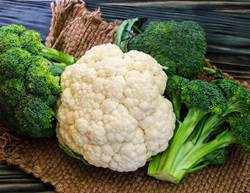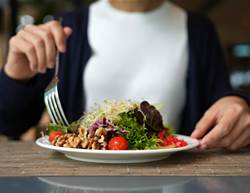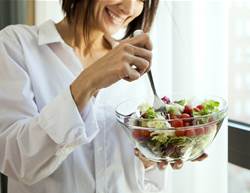We’re told to eat our vegetables for good reason—they’re packed with gut-friendly fibre and health-protective antioxidants. Now, one particular group—cruciferous vegetables like broccoli, cauliflower, kale and Brussels sprouts—may deserve extra space on the plate.
Emerging research suggests that eating enough of them could help protect against bowel cancer, which remains one of the most commonly diagnosed cancers in Australia. Bowel cancer is the second deadliest cancer and the fourth most common newly diagnosed cancer in Australia.
Below, experts explain the findings and share more about the veggie family and how you can eat them to reap their benefits.
What did the study find?
A large meta-analysis published in BMC Gastroenterology reviewed data from 17 studies and nearly 100,000 participants who self-reported their intake of cruciferous vegetables. The researchers compared cancer incidence between those with the highest versus the lowest intake.
The results suggested that eating 40 to 60 grams of cruciferous vegetables per day—about half a cup of cooked broccoli or two to three cups of raw kale—may lower the risk of developing colon cancer by nearly 20%, explains registered dietitian nutritionist Elizabeth Harris.
“These results strengthen the evidence that diet, particularly vegetable intake, plays an important role in colon cancer prevention,” says food scientist and recipe developer Jennifer Pallian.
Board-certified gastroenterologist Dr Supriya Rao adds that the protective effect seems to plateau at around 40 to 60 grams per day. “Consistency matters more than quantity—regular intake is key,” she says.
What are cruciferous vegetables and how could they fend off cancer?
“Cruciferous vegetables are plants in the Brassicaceae family, known for their distinctive cross-shaped flowers,” says Pallian. Popular varieties include broccoli, Brussels sprouts, cabbage, cauliflower, kale, collard greens, kohlrabi, mustard greens, rutabaga, turnips, bok choy and Chinese cabbage. Others with similar properties outside the Brassica family include rocket (arugula), radish, horseradish, watercress and even wasabi.
A plant-forward, fibre-rich diet is already recognised for reducing bowel cancer risk, explains Dr Rao, but cruciferous vegetables contain unique compounds that may give them an extra edge. They’re rich in glucosinolates, sulphur-containing compounds that break down into isothiocyanates (ITCs). These bioactive molecules support the body’s natural detoxification processes, help clear out cancer-causing agents, encourage healthy cell turnover and reduce inflammation.
Research has also shown that ITCs may:
- trigger the death of cancer cells
- block the formation of blood vessels that feed tumours
- slow or stop uncontrolled cell growth
“These mechanisms suggest cruciferous vegetables don’t just support overall health—they may directly influence how cancer cells develop and spread,” says Harris.
On top of their protective potential, cruciferous vegetables deliver everyday nutrition. They’re high in fibre, vitamin C, carotenoids and flavonoids—nutrients linked to gut health, reduced inflammation and antioxidant support, Pallian notes.
How to eat more cruciferous veggies
“Adding cruciferous vegetables to your meals doesn’t have to be complicated—and it can be seriously delicious,” says Pallian. A few easy ways to start:
- Crispy sides: Toss broccoli florets in olive oil and spices, then pop them in the air fryer for a quick and crunchy addition to dinner.
- Takeaway swap: A beef-and-broccoli stir-fry is speedy, satisfying and has that comforting takeaway feel—without the price tag.
- Hearty lunches: Roast cauliflower, kale and chickpeas, then top with a tangy yoghurt dressing for a fibre-packed, plant-forward meal.
- Everyday classics: Coleslaw made with cabbage—creamy or lightened with yoghurt—never goes out of style.
If you prefer sneaky nutrition boosts, Pallian suggests blending a handful of kale into a banana smoothie or stirring broccoli into a creamy pasta sauce. “You’ll get the flavour and the nutrients, with a little extra green power,” she says.
One thing to keep in mind: cruciferous vegetables can sometimes cause bloating or gas. “Introduce them slowly and drink plenty of water to support digestion,” advises Harris.
Variety matters too. “Try to eat the rainbow and aim for 30 or more different plants each week,” says Dr Rao. “It doesn’t have to happen overnight—small changes really do add up.”










